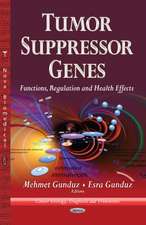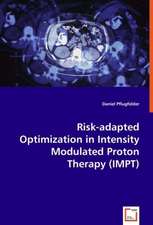mTOR Inhibition for Cancer Therapy: Past, Present and Future
Editat de Monica Mita, Alain Mita, Eric K. Rowinskyen Limba Engleză Hardback – dec 2015
Over the last 10 years, inhibitors of mTOR have emerged as a major class of anticancer drugs. Two rapamycin analogs are currently approved for the treatment of renal cell carcinoma, and it is estimated that a variety of other tumor types could benefit from mTOR inhibition, with numerous clinical trials (including pivotal registration trials) already underway. Second-generation small-molecule inhibitors of the pathway have also shown promise in terms of their superior tolerability and efficacy and are undergoing extensive clinical evaluation, with an estimated 30+ compoundscurrently under evaluation.
| Toate formatele și edițiile | Preț | Express |
|---|---|---|
| Paperback (1) | 653.35 lei 6-8 săpt. | |
| Springer – 23 aug 2016 | 653.35 lei 6-8 săpt. | |
| Hardback (1) | 672.05 lei 38-44 zile | |
| Springer – dec 2015 | 672.05 lei 38-44 zile |
Preț: 672.05 lei
Preț vechi: 707.43 lei
-5% Nou
Puncte Express: 1008
Preț estimativ în valută:
128.61€ • 139.65$ • 108.03£
128.61€ • 139.65$ • 108.03£
Carte tipărită la comandă
Livrare economică 19-25 aprilie
Preluare comenzi: 021 569.72.76
Specificații
ISBN-13: 9782817804910
ISBN-10: 2817804910
Pagini: 400
Ilustrații: VI, 300 p.
Dimensiuni: 155 x 235 x 18 mm
Greutate: 0.73 kg
Ediția:1st ed. 2016
Editura: Springer
Colecția Springer
Locul publicării:Paris, France
ISBN-10: 2817804910
Pagini: 400
Ilustrații: VI, 300 p.
Dimensiuni: 155 x 235 x 18 mm
Greutate: 0.73 kg
Ediția:1st ed. 2016
Editura: Springer
Colecția Springer
Locul publicării:Paris, France
Public țintă
Professional/practitionerCuprins
Forward.- Past.- mTOR inhibitors: a little bit of history.- Present.- The mTOR pathway .- The evolving role of mTOR inhibitors in renal cell carcinoma.- The role of mTOR inhibitors in breast cancer.- The role of mTOR inhibitors in neuroendocrine tumors.- New indications of mTOR inhibitors in rare tumors.- The role of mTOR inhibitors in the treatment of hematological malignancies.- The clinical pharmacology and toxicity profile of rapalogs.- Resistance to mTOR inhibitors.- Rational combinations of mTOR inhibitors as anticancer strategies.- Future.- Predictive biomarkers of response to mTOR inhibitors.- The potential future indication of rapamycin analogs for the treatment of other solid tumors.- mTOR inhibition beyond rapalogs.- mTOR, aging and cancer: the missing link?.- New study design for mTOR inhibitors and other biological agents.- Future directions for the development of mTOR inhibitors.
Notă biografică
Monica Mita and Alain Mita are Associate Professors of Medicine and Co-Directors of the Experimental Therapeutics Program at the Samuel Oschin Comprehensive Cancer institute, Cedars-Sinai Medical Center in Los Angeles, CA. Eric Rowinsky is Chief Medical Officer, Head of Research and Development, and Executive Vice President at Stemline Therapeutics, Inc. He is also an Adjunct Professor of Medicine at New York University School of Medicine and a cancer drug development consultant at Oncodrugs.
Textul de pe ultima copertă
This book describes the challenges involved in developing mTOR inhibitors for cancer treatment, starting with an in-depth examination of their molecular mechanism of action, with emphasis on the class side-effects, efficacy and mechanisms of resistance, as well as on promising novel directions for their development, including novel compounds and rational combinations with other anti-neoplastic drugs.
Over the last 10 years, inhibitors of mTOR have emerged as a major class of anticancer drugs. Two rapamycin analogs are currently approved for the treatment of renal cell carcinoma, and it is estimated that a variety of other tumor types could benefit from mTOR inhibition, with numerous clinical trials (including pivotal registration trials) already underway. Second-generation small-molecule inhibitors of the pathway have also shown promise in terms of their superior tolerability and efficacy and are undergoing extensive clinical evaluation, with an estimated 30+ compounds currently under evaluation.
Caracteristici
First book on that topic Input and perspectives by international leaders? Preclinical and clinical data available on the subject have been integrated A dedicated chapter on toxicity profile of mTOR inhibitors Future directions for the development of mTOR inhibitors





















